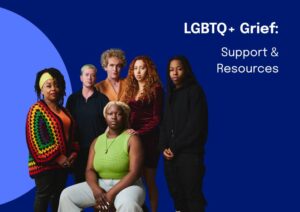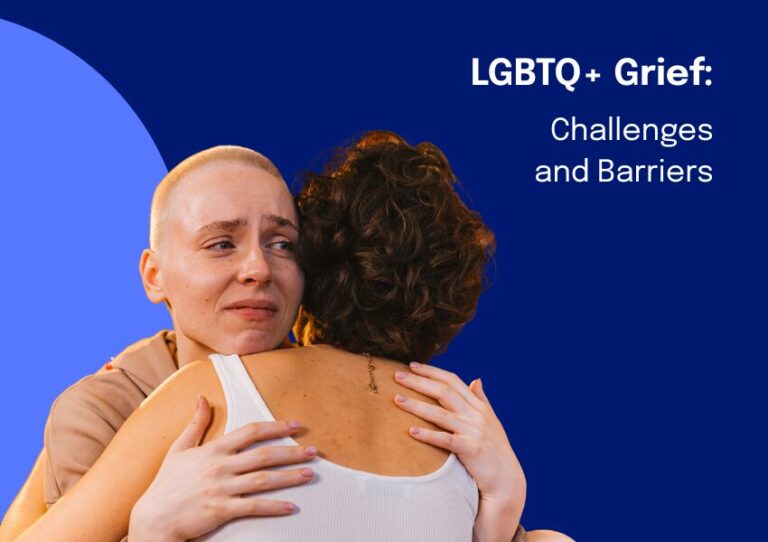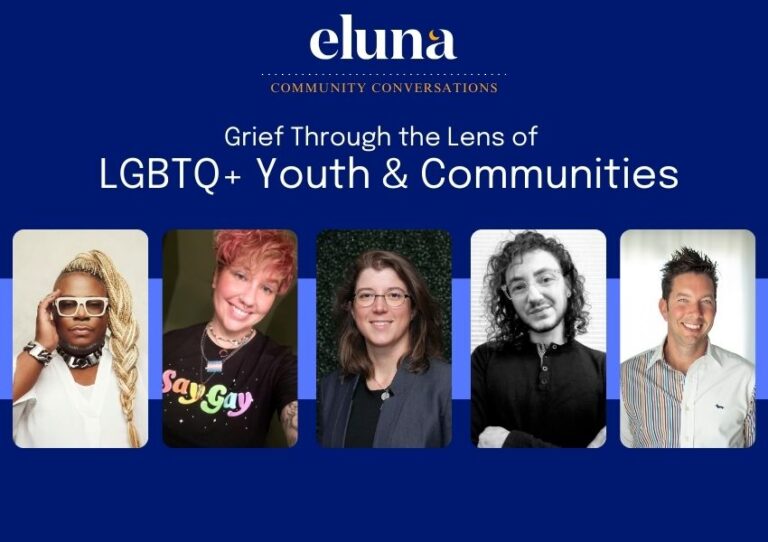LGBTQ+ Grief: Support and Resources
 LGBTQ+ grief is a multifaceted and deeply personal experience that arises from the unique challenges and adversities faced by individuals within lesbian, gay, bisexual, transgender, queer and questioning communities. While grief is an integral part of the human experience, LGBTQ+ youth and adults often navigate additional layers of emotional complexity due to societal stigma, discrimination, and the struggle for acceptance in a heteronormative world.
LGBTQ+ grief is a multifaceted and deeply personal experience that arises from the unique challenges and adversities faced by individuals within lesbian, gay, bisexual, transgender, queer and questioning communities. While grief is an integral part of the human experience, LGBTQ+ youth and adults often navigate additional layers of emotional complexity due to societal stigma, discrimination, and the struggle for acceptance in a heteronormative world.
Here are some recommended steps to address these barriers and cultivate queer affirming spaces:
Increase Education and Training
Provide comprehensive training to bereavement support providers to enhance their understanding of LGBTQ+ experiences, identities, and specific grief challenges faced by queer and trans individuals.
- Watch Grief Through the Lens of LGBTQ+ Youth & Communities. In this installment of Eluna’s Community Conversatoin, a panel of though-leaders invited us to expand the definition of grief by honoring intergenerational activism, intersectionality, and collective grief experiences within queer & trans communities. The panel also explored unique barriers to grief support and actionable steps to build brave and affirming spaces for LGBTQ+ youth and communities.
- Read this insightful story about Penelope’s journey of love, loss and renewed hope.
- Consider reading one of these young adult LGBTQ books on grief & loss.
- Watch Caregiving for Children in the LGBT+ Community with Grief and Loss with clinicians Sam Middleton, MS and CJ Roseberry, MSW of Uplift Center for Grieving Children who share advice and experience to guide caregivers supporting a grieving LGBTQ+ child. These steps include active listening, safety planning, ideas for encouraging your child to live authentically, and how to engage in community support
Utilize LGBTQ+ Inclusive Language:
Incorporate queer affirming language and terminology that respects and validates diverse gender identities and expressions throughout the support process.
- When introducing yourself, model by sharing your pronouns and asking the other person to share theirs.
- In forms and paperwork ask for gender (NOT sex), pronouns, and a preferred name.
- You can also model and incorporate pronouns into email signatures, nametags, forms, and displayed names on online meetings/support groups.
Diverse Representation:
Ensure diverse representation in bereavement support materials, including LGBTQ+ specific resources to address the unique needs of the community. Consider including the Pride Flag on your website and print materials as a quick visual clue that will signal our commitment to inclusivity.
Address Social Stigma and Discrimination:
Develop strategies to tackle social stigma and discrimination faced by LGBTQ+ individuals, enabling them to feel more comfortable seeking bereavement support without fear of judgment.
Establish LGBTQ+ Support Groups:
Create or locate queer and trans specific support groups where individuals can connect with others with shared experiences, providing a sense of community and understanding.
Accessible Resources:
Make bereavement support resources readily available and accessible to queer and trans individuals, considering online platforms and virtual options for those in remote areas or facing mobility challeng
Inclusive Grief Counseling:
Ensure that grief counseling services are inclusive and culturally competent, offering specialized support to address the specific needs of queer and trans individuals.
- Reframe questions to be more inclusive: “Who is your support system?” instead of “Talk to me about your family support”?
- Provide space and time to explore disenfranchised, collective, and compounded grief experiences.
- Expand grief support to incorporate ambiguous and secondary loss.
- Sensitivity to intersectionality: Recognize and address the intersectionality of identities within the LGBTQ+ community, taking into account race, ethnicity, disability, and other factors that may compound grief experiences.
- Feedback and evaluation: Regularly seek feedback from LGBTQ+ individuals who have accessed bereavement support to assess the effectiveness and inclusivity of services, making ongoing improvements as necessary.
- Partner with LGBTQ+ organizations: Collaborate with LGBTQ+ organizations, consultants, and community centers to extend bereavement support networks and reach a broader audience. Here are few places to start:
- The Trevor Project provides information & support to LGBTQ young people 24/7, all year round.
- onePULSE Foundation is the nonprofit organization established in the aftermath of the June 12, 2016 tragedy at Pulse nightclub. The four pillars of our mission are to create and support a memorial that opens hearts, a museum that opens minds, educational programs that open eyes, and legacy scholarships that open doors.
- Trans Lifeline is a trans-led organization that connects trans people to the community, support, and resources they need to survive and thrive.
- Gender Spectrum works to create gender sensitive and inclusive environments for all children and teens.
- With over 20 years of experience in social justice facilitation and services for LGBTQIA individuals, Lyndon Cudlitz delivers customized training and technical assistance in the education, healthcare, nonprofit, business, government, and recreation sectors. Lyndon also provides education and consultation for LGBTQ+ individuals and their loved ones.
- Hetrick-Martin Institute offers a comprehensive package of direct services and referrals to support LGBTQIA+ youth between the ages of 13 and 24 and their families.
- Somos Familia provides resources in Spanish for families of LGBTQ people.
- LGBTQ Grief Loss Support on Facebook (2.7K members) is a caring place for LGBTQ+ people to grieve & share the loss of a loved one.
- Hope Health offers an LGBTQ+ Grief Support Group (virtual) that meets regularly. Led by a specially trained facilitator, this group provides a safe, confidential, and supportive setting for individuals experiencing grief related to loss.
- The Grievery is a virtual collective of care and connection, bringing adults together to practice leaning into grief with courage, compassion, and curiosity. The Grievery is a queer-owned feminist collective, a non-hierarchical space where anyone, anywhere can open up and reflect, to truly see and hear the fullness of humanity in themselves and others. They offer a queer grief gathering that takes place on the 1st of every month. The cost is $25 per session. For new gatherers — your first session is free!

